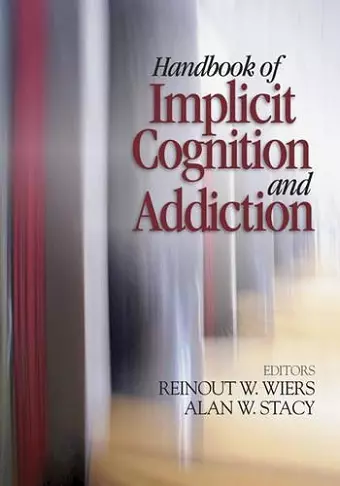Handbook of Implicit Cognition and Addiction
Alan W Stacy editor Reinout Wiers editor
Format:Hardback
Publisher:SAGE Publications Inc
Published:15th Feb '06
Currently unavailable, and unfortunately no date known when it will be back

"This book is a valuable source for both researchers and practitioners who are either familiar or unfamiliar with implicit cognition and addiction" —Emmanuel Kuntsche, ALCALA
Most research on cognitive processes and drug abuse has focused on theories and methods of explicit cognition, asking people directly to introspect about the causes of their behavior. However, it may be questioned to what extent such methods reflect fundamental aspects of human cognition and motivation. In response to this issue, basic cognition researchers have started to assess implicit cognitions, defined as "introspectively unidentified (or inaccurately identified) traces of past experience that mediate feeling, thought, or action." Such approaches are less sensitive to self-justification and social desirability and offer other advantages over traditional approaches underscored by explicit cognition.
Wiers′ Handbook of Implicit Cognition and Addiction lays the groundwork for new approaches to the study and addictive behaviors as the first handbook to apply principles of implicit cognition to the field of addiction. This Handbook features the work of an interdisciplinary group of internationally renowned contributing North American and European authors who have brought together developments in basic research on implicit cognition with recent developments in addiction research.
Key Features:
- Moves the field forward by integrating cutting-edge research from formerly independent disciplines that help provide a better understanding of the etiology, prevention, and treatment of addictive behaviors
- Lays the groundwork for new approaches to the study and treatment of addictive behaviors as the first handbook to apply principles of implicit cognition to the field of addiction
- Presents existing applications to the prevention and treatment of addictive behaviors as well as possibilities for future interventions based on new approaches based on implicit cognition
- Opens with a chapter, written by the volume editors, that outlines general theoretical issues and provides a roadmap to the book
- Provides integrative summaries – written by both "insiders" and "outsiders" to the field - in a final section, highlighting theoretical issues currently being debated within this newly emerging area of scholarship
This Handbook is a unique, invaluable addition to libraries as well as to the collections of academics, students, and professionals interested in how cognitive research can contribute to the understanding, prevention, and treatment of addictions.
" The addiction field needs a fresh approach.... it will be a ′first.′" -- David M. Warburton
"This book has the potential to pull together an important emerging area of research, frame the issues and future questions, and help develop ideas regarding prevention/intervention implications of this research. The addiction field has been moving in the direction of implicit cognition for some time, and I think that this volume has the potential to be the seminal contribution to the area." -- Kenneth Leonard
"I believe the need for such a compendium of research in this relatively new field is fully justified….The goal and scope of the text is consistent with my own views of where the field needs to go….The editors have done an excellent job in assembling a world-class list of contributors." -- Jon D. Kassel
"The editors have done a good job thinking of ways to make their volume distinctive….with the potential to wield a lasting impact on a field of immense social importance…Like the editors, I have a sense that important advances in our understanding of addictions will come from research that follows this handbook′s title." -- Raymond Klein
"I think the time is absolutely ripe for this book. The theories and methods of implicit cognition seem ideally suited to tap into the actual mechanisms of addiction, which involve low-level, unconscious cognitive processes that interact heavily with biological affective-motivational processes….the book is the first to synthesize this new, interdisciplinary field."
-- Piotr Winkielman"I think the integration of implicit cognition and addiction is a novel idea for a handbook and one that is needed given the increasing rate of research using implicit measures to understand the processes involved in addictive behaviors." -- Alan Marlatt & Brian Ostafin
"There is increasing interest in understanding the complexities of drug craving. The studies in this book probe beneath the surface of subjective ratings with sensitive measures of implicit craving, detecting important processes underlying decisions addicts make about drug use. Many researchers in addiction will find these analyses of the role of implicit processes in addiction valuable and timely." -- Kent Berridge
"At more than 500 pages, with 34 chapters in seven sections, it is definitely a Handbook with a capital H. The editors have done a great job of rounding up the usual suspects who publish on these topics. They have also chosen excellent contributors whose previous work is more immersed in cognition than in addiction. The book is thorough and appreciative of history but remains focused on cutting-edge topic." -- Mitch Earleywine * Contemporary Psychology: APA Review of Books *
"This book is a valuable source for both researchers and practitioners who are either familiar or unfamiliar with implicit cognition and addiction" —Emmanuel Kuntsche, ALCALA -- Emmanuel Kuntsche * Oxford University Press *
ISBN: 9781412909747
Dimensions: unknown
Weight: 510g
560 pages